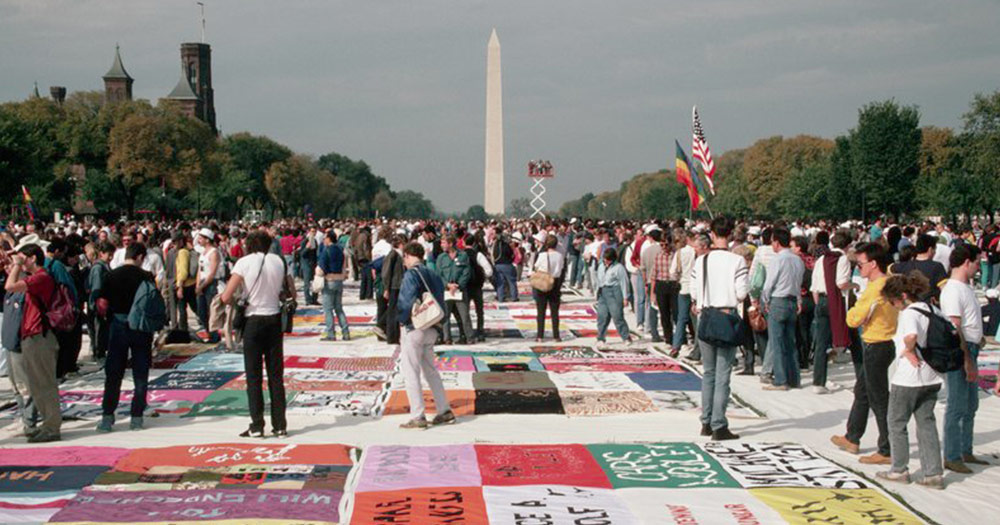The epidemic thrust people out of the closet because they were now sick and dying. So there was a tremendous amount of courage being displayed just by agreeing to talk to me.
It has been 35 years since AIDS was first diagnosed in Ireland. Jim Bunn came up with the idea for World AIDS Day with Thomas Netter while they were working as public information officers for WHO. In the first few years of the commemorative day, homosexuality was still illegal in Ireland and the stigmas attached to the AIDS crisis were affecting people’s access to credible information about the disease.
When asked by Time magazine what it was like advocating for the battle against AIDS in the 80’s, Bunn said:
“Back in that day, TV technicians were reticent, sometimes refused, to even put microphones on people with AIDS. I made a point in my stories of bringing a crew with me that had been educated about how the disease is transmitted, because I felt that it was incumbent on me to show them the utmost respect. These people were coming out at a time when the result of them being interviewed could get them fired, evicted, “out” them to their families and friends. The epidemic thrust people out of the closet because they were now sick and dying. So there was a tremendous amount of courage being displayed just by agreeing to talk to me.”
Mainstream media coverage of the disease was very limited in the 1980’s and 90’s. Most of the time when it did receive the coverage it was scaremongering, spin doctor type stories. In 1985, The Nationalist and Leinster Times even went so far as to suggest that it was “not AIDS, but homosexuality that was the killer disease”.
Although a lot of the stigma came from homophobia, a lot also came from fear and this was only compounded with what they were hearing in the media. Everything was very focused on the cause and not the solution, how to protect yourself against the disease was rarely discussed. In Ireland, it was still very taboo to publicly speak about sex in any way.
To combat this, LGBT+ groups were instrumental in providing accurate information about the disease during this time. The first information leaflet was created by the Gay Health Action group in 1985. Another important publication at this time was OUT magazine, Ireland’s first commercial queer publication. Thanks to these subversive publications, information acted as an anecdote: a medicine that didn’t need Government approval.

The Importance of Commemoration

World AIDS Day is an opportunity for people worldwide to unite in the fight against HIV, to show support for people living with HIV, and to commemorate those who have died from an AIDS-related illness.
In 2016, HIV & AIDS affects 1 in every 10,000 people in Ireland. Globally, there are an estimated 36.7 million people who have the virus. Despite the virus only being identified in 1984, more than 35 million people have died of HIV or AIDS, making it one of the most destructive pandemics in history.

Today, scientific advances have been made in HIV treatment, there are laws to protect people living with HIV and we understand so much more about the condition. To date, provisional figures for 2017 indicate there have been 450 new HIV diagnoses in Ireland, similar to this time last year when a total of 508 people were newly diagnosed as living with HIV [www.hpsc.ie]. People do not know the facts about how to protect themselves and others, and stigma and discrimination remain a reality for many people living with the condition.
Looking to the Future

In the lead up to World AIDS Day, there have been a number of milestones this year, including the announcement this morning that generic PrEP will be available from Monday in pharmacies and we continue to look to the future in how we should remember and respect the stories from the past.
Longtime advocate Tonie Walsh has been heading the campaign for a national AIDS memorial. When speaking to Masc he said that a memorial is needed in memory of “our war-torn dead, fractured memories of our walking wounded”, sacred accounts of “the heroism, the steadfastness in the face of brutality and oppression, the sacrifice and enormous emotional costs to those who survived such appalling loss and destruction. Hidden histories that yearn to be heard”.
Niall Mulligan, Executive Director of HIV Ireland, echoed Tonie’s sentiment: “A national AIDS memorial would recognise the lives lost, the grief and sorrow of those left behind, as well as acting as a reminder that there is still work to do to eliminate new HIV infections in Ireland, and combatting HIV-related stigma and discrimination”.
Find out what’s happening across the country today for World AIDS Day
For information about HIV, testing, safer sex and support please visit – www.hivireland.ie; www.man2man.ie; www.positivenow.ie
© 2017 GCN (Gay Community News). All rights reserved.

comments. Please sign in to comment.